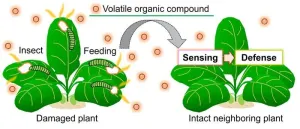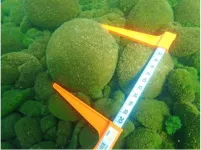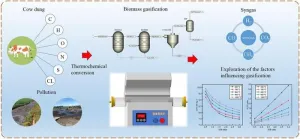(Press-News.org) Now is the time to identify the conditions that cause plants to die. Doing so will allow us to better protect plants by choosing conservation targets more strategically, UC Riverside botanists argue in a new paper.
Published in the Oxford Academic journal Conservation Physiology, the paper demonstrates how scientists can learn the limits past which plants’ vital functions shut down, and makes the case that not doing so is a mistake in this era of increasing drought and wildfires.
“We can measure the amount of water loss plants can tolerate before they start to wilt, and we can learn the temperature at which photosynthesis stops for different kinds of plants,” said Louis Santiago, UCR botany professor and corresponding author of the paper.
“It is so important to measure the critical limits of when things will fail, and not just how they’re doing now,” he said.
The UCR team believes understanding the current physiological status of a plant species during stress — which so many are experiencing more often with hotter, drier temperatures in many places — can be very useful for showing how close some plants are to local extinction already. Combined with critical limit data, limited conservation funds could be even more wisely spent, revealing plants’ warning signs before they become visible.
However, these critical stress limits are not often considered when assessing the health of plant populations, in part because they do not yet exist for most species. There are roughly 700,000 plant species on Earth, but only about 1,000 for whom the limits are known.
Plants can, in some cases, push past their limits for a short time and bounce back. For example, houseplants will wilt when they don’t get enough water, and bounce back when they finally receive it. However, if they stay wilted too long, they will likely die.
“Wilting, what we refer to as losing turgor pressure, is not always fatal but it’s one step toward death,” Santiago said. “Just like people with extremely high blood pressure might die if they don’t get it to come down.”
Santiago’s laboratory is focused on plant physiology, the chemical and physical processes associated with plant life. However, much of the activity in his lab has shifted in recent years to studying critical limits.
“It started after the last drought when we saw species suffering. We wanted to do these measurements to see if we could have predicted the die-offs that we saw,” Santiago said.
For this paper, he and his students measured the leaf wilting points for six species of Southern California chapparal shrubs, including California lilac and two types of sage. Their work demonstrates that there are multiple means to obtaining the critical limits and shows how the information could help conservation outcomes.
“Generally, we have the capacity to find the most vulnerable, rare species and focus on them. We have the ability to find which plants are most at risk from climate changes, but it’s going to take a collaboration of plant physiologists, conservation biologists, and land managers,” Santiago said.
Most plant species are going to face a climate in the coming decades that does not place them under the same kinds of stress they evolved to live in. For plant enthusiasts wanting to assist their survival, Santiago recommends getting involved with native plant societies.
“You can join them in pulling out invasive species, or count numbers of rare organisms, and there are countless volunteer projects,” Santiago said. “Let’s work smarter, and work together.”
END
How to help save plants from extinction
Predicting their demise could keep them alive
2023-10-17
ELSE PRESS RELEASES FROM THIS DATE:
Kennedy Krieger receives $5 million grant to expand reach of its pediatric post-COVID-19 clinic and support school students
2023-10-17
BALTIMORE, October 17, 2023—Researchers at Kennedy Krieger Institute have received a $5 million grant from the U.S. Department of Health and Human Services (HHS), through the Agency for Healthcare Research and Quality (AHRQ), to expand access to comprehensive care for children and adolescents with long COVID-19, particularly among underserved populations.
During the five-year project, researchers at the Pediatric Post-COVID-19 Rehabilitation Clinic will receive up to $1 million annually to expand and strengthen its integrative services in Baltimore and the overall mid-Atlantic ...
Can lifestyle interventions benefit patients with advanced breast cancer?
2023-10-17
MIAMI, FLORIDA (Oct. 17, 2023) – Can lifestyle interventions such as exercise and intermittent fasting help patients with advanced breast cancer better tolerate side effects from treatment?
That is the question Tracy Crane, PhD, RDN, and Carmen Calfa, MD, at Sylvester Comprehensive Cancer Center at the University of Miami Miller School of Medicine and their collaborators will strive to answer with a $4-million, five-year grant from the National Cancer Institute (NCI).
Crane, co-lead of Cancer Control and director of Lifestyle Medicine, Prevention and ...
Unlocking nature's silent conversations: Real-time visualization of plant-plant communications through airborne volatiles
2023-10-17
Saitama, Japan: Plants emit volatile organic compounds (VOCs) into the atmosphere upon mechanical damages or insect attacks. Undamaged neighboring plants sense the released VOCs as danger cues to activate defense responses against upcoming threats (Figure 1). This phenomenon of airborne communication among plants through VOCs was first documented in 1983 and has since been observed in more than 30 different plant species. However, the molecular mechanisms underlying VOC perception to defense induction remain unclear.
Unveiling the Invisible Conversation
The ...
Critical step made for managing brushtail possums
2023-10-17
Researchers say mapping the genetic code of the brushtail possum will benefit those working to both conserve and control the animal.
In a five-year long study, just published in Nature Communications, an international group of researchers led by the University of Otago, has assembled the entire genetic code of the marsupial mammal.
The work also uncovered where and when their genes are expressed, and revealed surprising details about their population diversity, reproduction, and origins.
Study lead Associate Professor Tim Hore, of Otago’s Department of Anatomy, describes possums as “a fascinating animal that is loved ...
Surprising discovery about coral’s resilience could help reefs survive climate change
2023-10-17
The factors affecting coral’s resilience — its ability to adapt to and survive environmental changes — seem to be more nuanced than scientists believed.
In a study published Oct. 18 in the journal Global Change Biology, researchers reveal surprising findings about a species common to Caribbean waters. The discovery may help improve efforts to save corals from bleaching and other consequences of climate change.
A team led by Assistant Professor of Biological Sciences Carly Kenkel at the USC Dornsife College of Letters, Arts and ...
Ushering in the era of light-powered 'multi-level memories'
2023-10-17
We live in an era of data deluge. The data centers that are operated to store and process this flood of data use a lot of electricity, which has been called a major contributor to environmental pollution. To overcome this situation, polygonal computing systems with lower power consumption and higher computation speed are being researched, but they are not able to handle the huge demand for data processing because they operate with electrical signals, just like conventional binary computing systems.
The Korea Institute of Science ...
Staggering increase in opioid-related deaths among people experiencing homelessness, new study finds
2023-10-17
London, ON, October 17, 2023 – People experiencing homelessness accounted for an increasing proportion of fatal opioid-related deaths in Ontario, Canada, reaching one in six such deaths by 2021, according to new research from ICES, Western University and Lawson Health Research Institute.
In one of the first reports to track the continuous increase in opioid-related mortality in the province among people experiencing homelessness, researchers found that the quarterly proportion of opioid-related overdose ...
Subalpine forests in the Northern Rockies are fire resilient—for now
2023-10-17
Over 4,800 years in the Northern Rockies during wet periods and dry periods, subalpine forests consistently recovered from wildfires, growing back vegetation and leaving evidence of their resilience in lake sediment cores.
Kyra Clark-Wolf, now a CU Boulder postdoc with the North Central Climate Adaptation Center (NC CASC), led the study as part of her dissertation research. NC CASC is a partnership of CU Boulder and the United States Geological Survey.
“I thought we might see different ecosystem responses to past fires between wet and dry periods,” said Clark-Wolf. “But ...
Unique marimo threatened by rising lake temperatures
2023-10-17
Rising lake water temperatures threaten the survival of marimo, unique algal balls found only in cold lakes. Kobe University researchers clarified that the warmer it gets, the more the inward decomposition outpaces the outward growth of these life forms, making them increasingly fragile.
Moss balls, or “marimo” in Japanese, are popular pet water plants that are not a moss but a special growth form of filamentous algae. They are found naturally in lakes in northern Japan and cold lakes of ...
How to scientifically, efficiently, and cost-effectively treat the wastewater generated from anaerobic digestion?
2023-10-17
The resource utilization of waste is an important means to implement the construction of ecological civilization. Agricultural waste contains rich renewable resources and has high potential value in fertilization and energy conversion. Anaerobic digestion technology is a promising technology for treating agricultural waste. Anaerobic digestion refers to the digestion technology in which organic matter is decomposed into CH4, CO2, H2O and H2S by facultative bacteria and anaerobic bacteria under anaerobic conditions, which can transform solid organic matter into soluble organic matter. Not only does it have the advantages of stable process and low operation cost, the biogas produced can also ...
LAST 30 PRESS RELEASES:
Genetic risk for mental illness is far less disorder-specific than clinicians have assumed, massive Swedish study reveals
A therapeutic target that would curb the spread of coronaviruses has been identified
Modern twist on wildfire management methods found also to have a bonus feature that protects water supplies
AI enables defect-aware prediction of metal 3D-printed part quality
Miniscule fossil discovery reveals fresh clues into the evolution of the earliest-known relative of all primates
World Water Day 2026: Applied Microbiology International to hold Gender Equality and Water webinar
The unprecedented transformation in energy: The Third Energy Revolution toward carbon neutrality
Building on the far side: AI analysis suggests sturdier foundation for future lunar bases
Far-field superresolution imaging via k-space superoscillation
10 Years, 70% shift: Wastewater upgrades quietly transform river microbiomes
Why does chronic back pain make everyday sounds feel harsher? Brain imaging study points to a treatable cause
Video messaging effectiveness depends on quality of streaming experience, research shows
Introducing the “bloom” cycle, or why plants are not stupid
The Lancet Oncology: Breast cancer remains the most common cancer among women worldwide, with annual cases expected to reach over 3.5 million by 2050
Improve education and transitional support for autistic people to prevent death by suicide, say experts
GLP-1 drugs like Ozempic could cut risk of major heart complications after heart attack, study finds
Study finds Earth may have twice as many vertebrate species as previously thought
NYU Langone orthopedic surgeons present latest clinical findings and research at AAOS 2026
New journal highlights how artificial intelligence can help solve global environmental crises
Study identifies three diverging global AI pathways shaping the future of technology and governance
Machine learning advances non targeted detection of environmental pollutants
ACP advises all adults 75 or older get a protein subunit RSV vaccine
New study finds earliest evidence of big land predators hunting plant-eaters
Newer groundwater associated with higher risk of Parkinson’s disease
New study identifies growth hormone receptor as possible target to improve lung cancer treatment
Routine helps children adjust to school, but harsh parenting may undo benefits
IEEE honors Pitt’s Fang Peng with medal in power engineering
SwRI and the NPSS Consortium release new version of NPSS® software with improved functionality
Study identifies molecular cause of taste loss after COVID
Accounting for soil saturation enhances atmospheric river flood warnings
[Press-News.org] How to help save plants from extinctionPredicting their demise could keep them alive








